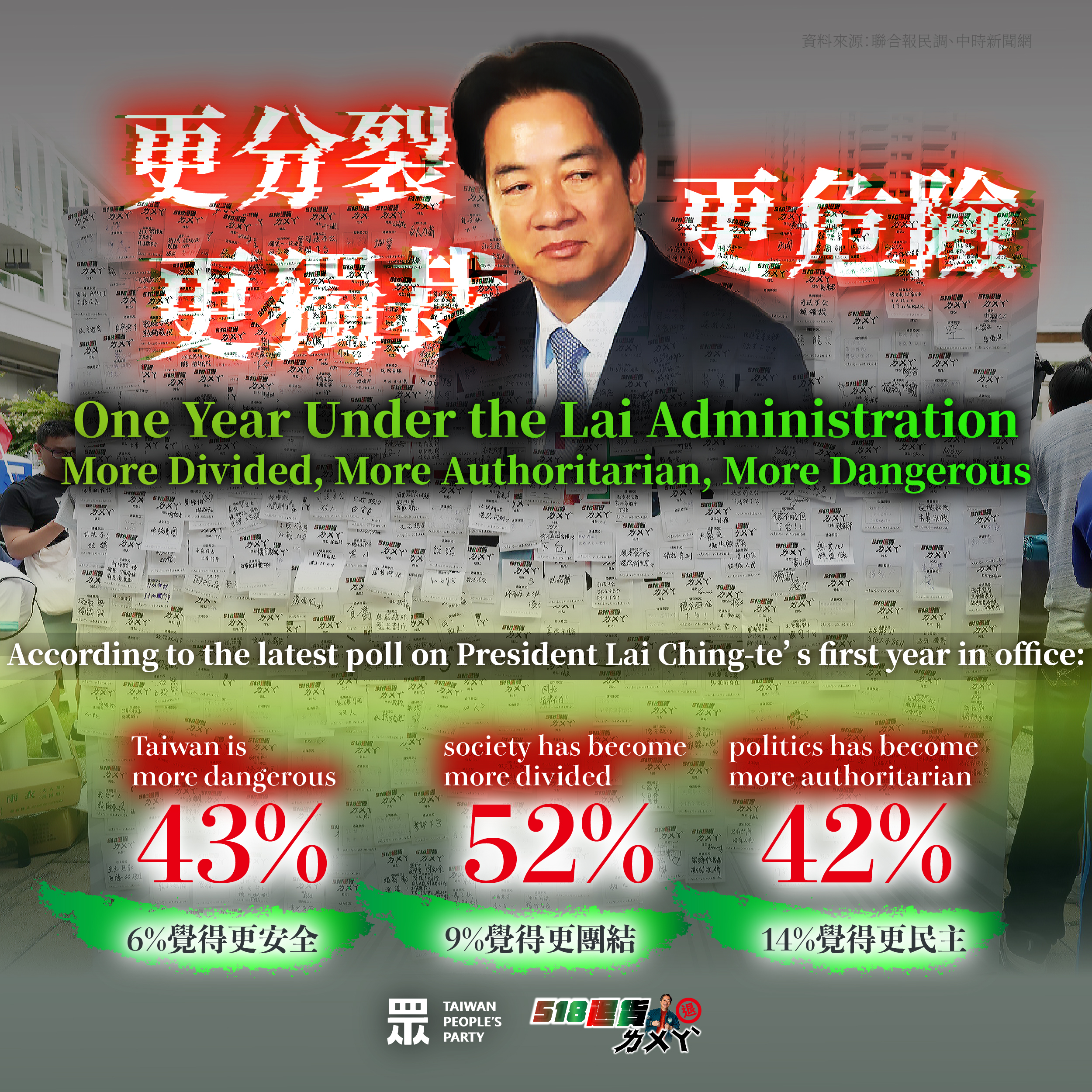Lai’s Inauguration Anniversary Speech – TPP Criticizes: “Lost in Headwinds, Rocked by Turbulence”

As President Lai Ching-te marks his first year in office on May 20th, many people are filled with mixed feelings . Over the past year, under President Lai’s leadership, Taiwan has remained stagnant and mired in internal strife. In today’s presidential address, we saw no sign of Taiwan “transforming in the face of headwinds”; instead, we deeply felt that Taiwan is “lost in the storm.” President Lai has not led the country to “steady progress,” but rather, due to the government's lack of preparation amid the tensions between the two major powers—the U.S. and China—Taiwan finds itself in an increasingly “bumpy” situation.
In response to President Lai’s mention of holding an “important national security briefing” for opposition party leaders, the Taiwan People’s Party states that such dialogue among major political leaders should have taken place long ago. Bringing it up only now, on the first anniversary of his inauguration, is dilatory.
Over the past year, Taiwanese society has consistently hoped that President Lai would embrace the responsibility of fostering unity and actively engage in dialogue and cooperation with opposition parties. The Taiwan People’s Party believes that in order to conduct truly meaningful communication and bridge the social divide caused by the Democratic Progressive Party, President Lai’s proposal for “candid and sincere exchanges of views and joint discussions on national affairs” must be grounded in a framework free of preconditions and preset positions. Only then can we honestly confront the major challenges facing the nation, both domestically and internationally, and address the key issues that concern the people.
Looking back on the past year of national governance, and in light of today’s (May 20th) speech, it is even more evident that President Lai continues to deceive both himself and the public. Trade agreements remain all talk with no progress. The U.S.-Taiwan 21st Century Trade Initiative has stalled, and there has been no development on CPTPP accession.
Most critically, in response to the U.S. tariffs, the government has shown a lack of coordination and strategic planning. Although President Lai made sweeping promises that negotiations with the United States would secure Taiwan’s best interests, the administration’s handling of these talks has, in reality, eroded public confidence.
Following the impact of U.S. tariffs, the number of workers placed on unpaid leave has suddenly increased by over 1,000 in just one month. Meanwhile, the sharp fluctuations in the New Taiwan Dollar exchange rate have posed unprecedented challenges to small and medium-sized enterprises, leaving workers hopeless.
President Lai’s governance can be summed up as “incompetent abroad, ineffective at home and.” Social housing projects have made only sluggish progress, the Indigenous Defense Submarine (IDS) program is facing delays, and renewable energy goals remain out of reach. Since the phase-out of nuclear power, thermal power has skyrocketed to nearly 90% of the energy mix. Both the energy transition and national defense efforts have been marked by “much talk, little action.”
President Lai’s approach to national governance can be summed up as “Incompetent in dealing with external challenges and ineffective in managing domestic affairs.” Progress on social housing has been sluggish, the indigenous submarine project is delayed, and renewable energy goals remain out of reach. Since the phasing out of nuclear power, thermal power generation has surged to nearly 90% of the energy mix. Both energy transition and national defense preparedness have been characterized by much talk but little action.
Today, President Lai addressed nuclear energy by referencing “two musts and three principles,” which include ensuring safety, resolving nuclear waste issues, and achieving social consensus. In that case, we call on President Lai to put the question of whether to extend the operation of the Maanshan Nuclear Power Plant (Nuclear Power Plant No. 3) to a referendum. Doing so would not only demonstrate a commitment to direct democracy but would also be the clearest way to “resolve disputes through greater democracy.”
Finally, the Taiwan People’s Party would like to reiterate that Taiwan’s hard-won democracy must be safeguarded through the joint efforts of both the ruling and opposition parties. We emphasize that the precious democratic achievements earned through the sacrifices of our democratic forebears must not be allowed to regress into the path of authoritarianism. The principles of democratic rule of law—oversight and checks and balances—must not be restricted, much less dismantled. The judicial scales, which represent fairness and justice, must not be tilted in favor of those in power, and certainly must not be wielded as a tool against dissent. National governance must be grounded in genuine public opinion, not in smearing or red-tagging those who dare to question. We urge the Lai administration to open its heart, embrace transparency, and sincerely respond to the voices, concerns, and expectations of the people.



